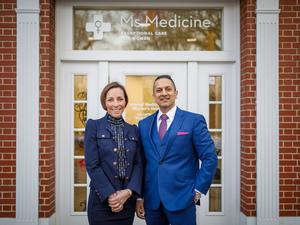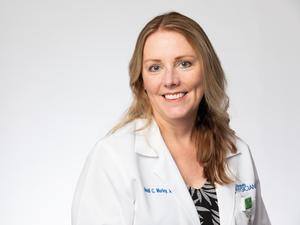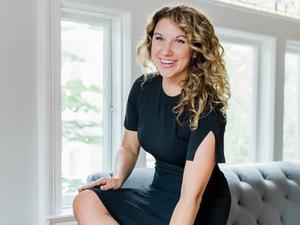It’s a recent summer afternoon, and Dr. Lisa Larkin is seated on the sofa in the living room of her Indian Hill home.
It’s an idyllic setting from which to review the finer points of her career: how she landed in Cincinnati more than 30 years ago, why she wanted to initially study internal medicine, and how, at nearly 60-years-old, after two separate, multiyear stints as a hospital-employed physician, she’s out on her own again, this time, helming a fast-growing health care/femtech startup, Ms.Medicine, and looking to scale it exponentially.
Building a new company is difficult. But gone are the days when she’d see almost 30 patients a day. In conversations, Larkin frequently basks in that particular fact.
“Every single part of my career has led me to this place,” she said.
The finer details certainly paint that picture. She not once, but twice, quit her job at the University of Cincinnati, took out a business loan, and launched her own medical practice, all part of her mission to make health care better for all.
Since its launch in 2018, Mariemont-based Ms.Medicine is doing just that, she said. The concierge primary care model with a heavy emphasis on women’s health will open its ninth, 10th, 11th and 12th locations over the next couple of weeks.
Longer term, Larkin wants to grow that number to more than 50. Never mind there’s still an ongoing global pandemic, and the ever-increasing buzz of venture capitalists in her ear. If she’s successful, Ms.Medicine will shake up the status quo, making Larkin not just an M.D., founder and CEO, but also a disruptor.
Why concierge care?
A Yale School of Medicine graduate, Larkin gravitated to internal medicine because it was considered the premier specialty at the time. Women’s health wasn’t on her radar, but that changed shortly after landing at UC in 1991.
Women are severely underserved when it comes to health care, she said. Systematically, there are about 700 diseases where women present with the same symptoms as men yet are diagnosed later. When it comes to clinical trials for new drugs and treatment, studies have not always adequately enrolled women. And providers traditionally have little access to training in areas of women’s health.
Early in her career, Larkin tried to address the outsized need while at UC, first as an associate professor, then as director of the UC Health Women’s Center in West Chester, but she felt spread too thin. Visits were too short, and her compensation was based on productivity. It’s a common thread echoed among the growing ranks of Ms.Medicine providers.
“I never saw myself leaving academics,” Larkin said. “I thought I’d retire there. But I would end every day feeling overwhelmed — like I had failed.”
Women aged 40 to 65 are particularly prone to “fall through the cracks.” While her practices treat patients of all ages, Larkin has homed in on that middle-aged demographic. And it makes tremendous business sense. The menopause market was valued at $15.4 billion in 2021, per San Francisco-based Grandview Research. Responding to those needs is a $600 billion opportunity, according to the Female Founders Fund, a New York-based venture capital firm.
Concierge care has gained quick traction. It also helps make Ms.Medicine what it is today. The model traditionally requires users pay a membership fee for conveniences such as same-day appointments and 24/7 access. About half of concierge care physicians take insurance, Larkin said. The other 50%, herself included, don’t. Removing commercial payors gives doctors more freedom.
Visits are longer, more personalized and prevention based. Appointments run 30, 60, sometimes even 90 minutes long. Instead of seeing 27 or 28 patients a day, like before, Larkin sees 12 to 14. Fifteen a day is considered high, she said, and 16 is “rare.”
There’s a stigma concierge care is only for the wealthy, but about a third of patients at Ms.Medicine sit in the bottom third of income. And scholarships are available.
For Dr. Laurie Birkholz, the model goes beyond giving a patient her cell phone number. She opened Laurie Birkholz, MD, and Associates in Holland, Mich., in July 2020 – the third practice under the Ms.Medicine umbrella.
Access is part of it. “For some people, it’s a very important piece,” she said. For Birkholz, it means there’s enough time in the day to return messages or hold family meetings to plan care for more elder patients. She can call a specialist and have a conversation about a patient “in a way most docs don’t have time for.”
Much like Larkin, Birkholz struggled under the traditional care model. “It was all about, ‘How many patients can you see in a day?’ ‘How many RVUs (relative value units, a factor used to determine compensation) can you generate?’”
The frustration didn’t stop with her. “Patients are burned out. When you look at the profit margins for insurance companies, when you see the bonuses being paid to hospital CEOs and the big flashy buildings they’re creating in competition with the system down the street … I don’t know how long that’s sustainable.”
Scaling the model
Larkin is accelerating the concept, especially of late. Ms.Medicine has grown from two locations in 2020 to eight today – with four more set to open in August and September in Florida, Colorado, New Jersey and Pennsylvania. More could come online before the end of 2022.
Dr. Shawn Ryan, chief medical officer and co-founder of BrightView Health, a Walnut Hills outpatient addiction treatment provider that’s quickly expanding its own U.S. footprint, joined Ms.Medicine earlier this year as its newest board member and minority investor. It’s a space “definitely underserved,” he said.
Larkin’s mission is also more personal to him. He lost his mother to ovarian cancer shortly after she turned 60.
“‘Sky’s the limit’ is such an old adage,” he said. “But there’s a lot of room to grow, a lot of development to be done, a lot of better care to be had.”
Larkin’s plan for growth is based on a “perfect world” scenario. There’s plenty of market uncertainty. Physicians seem tied to longer “outs” in their contracts. There’s concern, too, she’ll overstretch her already thin team.
“We have a steep trajectory,” she said. Opening new practices is expensive and involves a lot of hands-on support. Each provider, each community, is different. Doctors have various levels of training Ms.Medicine requires certain continuing medical education hours. What works in terms of messaging in one city may not resonate in another.
Lauren Thaman, vice president of marketing at Ms.Medicine, said the learning curve is steeper. “What we knew two weeks ago versus today is light years different,” she said. Thaman joined the company after retiring in June from Procter & Gamble, the ninth member of the growing Ms.Medicine leadership team.
“I drank the Kool-Aid,” she said. “This is going to change women’s health care. And Lisa’s team is some of the strongest, most capable people I’ve ever worked with in my entire 36-year career. They are so strong, so ambidextrous.”
The push will be easier if a planned fundraise is successful. Larkin closed a small seed funding round in 2020, and Ms.Medicine is poised to raise a new multimillion-dollar Series A soon. Larkin declined to disclose the target investment amount but rounds at that stage tend to fall around $10 million, per data insights company Crunchbase.
The funds would allow the company to accelerate its buildout. “We need a larger sales team, a larger operations team,” Larkin said. “There’s so much opportunity.”
Beyond the CEO role
Larkin’s original target was to scale to 50 locations. With investors involved, it’s likely the count won’t stop there. And yet, there is an end game, an exit strategy. She does not see herself as the long-term CEO, although that transition is still three or four years down the line.
Every Ms.Medicine provider signs a five-year commitment, enough time for the company to slowly recoup its investment. It costs more than $100,000 to launch each practice. The hope is those physicians see enough value that they renew (providers own their practice at the end of the licensing agreement), but the company hasn’t yet reached that measuring stick and won’t until 2024.
Larkin’s goal is to step fully into the education side of the business, perhaps in a chief medical officer role. She already frequently speaks nationally. Dozens of clinicians tune in weekly to her Monday evening virtual case conferences.
She also sees herself continuing to train other doctors, maybe even adopting a Ms.Medicine certification for health systems, so no patient is overlooked again. Even if the company grows to 50-plus locations, that’s a “drop in the ocean” in terms of patients it can see.
Menopause also disproportionately affects women of color, and Larkin believes the best way to reach underserved communities in particular is by educating physicians working in those areas. “Building a profitable company will let me do those things. By stepping out, I have the most ability to impact women’s health in the long term,” she said.
Larkin is also looking to mentor those coming up in the business, like Birkholz in Michigan. As Ms.Medicine grows, its teaching platform can as well. Concierge care may not be the only path forward, but it moves the needle.
“Lisa’s ultimate mission is not to have a Ms.Medicine provider in every city, but for every physician to think differently about women’s health — or that they’re thinking about women’s health at all,” Birkholz said.
Perhaps one day, there will be a board certification in women’s health. Larkin has been told it’s impossible, “that it’s an uphill battle I will never win.” But that hasn’t slowed her before.
“There’s lots of other big things I want to do,” Larkin said, perched on her living room sofa. “There’s a lot of work to be done between now and then.”








